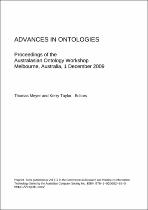 ResearchSpace
ResearchSpace
Advances in ontologies, proceedings of the Australasian ontology workshop, Melbourne, Australia
JavaScript is disabled for your browser. Some features of this site may not work without it.
- ResearchSpace
- →
- Research Publications/Outputs
- →
- Conference Publications
- →
- View Item
| dc.contributor.author |
Meyer, T (ed)

|
|
| dc.contributor.author |
Taylor, K (ed)

|
|
| dc.date.accessioned | 2010-08-16T09:45:52Z | |
| dc.date.available | 2010-08-16T09:45:52Z | |
| dc.date.issued | 2009-12 | |
| dc.identifier.citation | Meyer, T (ed), and Taylor, K (ed). 2009. Advances in Ontologies. Proceedings of the Australasian Ontology Workshop, Melbourne, Australia, 1 December 2009. 5th Australasian Ontology Workshop (AOW 2009), Vol. 90, pp 68 | en |
| dc.identifier.isbn | 978-1-920682-91-0 | |
| dc.identifier.uri | http://ksg.meraka.org.za/~aow2009/aow09-preproceedings.pdf | |
| dc.identifier.uri | http://hdl.handle.net/10204/4150 | |
| dc.description | Meyer, T (ed), and Taylor, K (ed). 5th Australasian Ontology Workshop (AOW 2009), Melbourne, Australia, 1 December 2009 | en |
| dc.description.abstract | In 2004, a small team of investigators undertook a prototype development effort to explore how semantics could be inserted in several existing scientific data systems being supported by the High Altitude Observatory at the National Centre for Atmospheric Research. The problem to be solved was: discovery and access to interdisciplinary and heterogeneous data sources without very detailed expert knowledge of the domain which included cryptic jargon (mnemonics). Ontology development expertise was included in the team but instead of a bottom-up or top-down approach to ontology development, we used a variant on the use case driven design to formalize vocabulary and relation requirements. The authors also had to use much of the existing infrastructures. Instead of a prototype the result was a production semantic data framework after about the first 9 months of the project. Several successive releases based on implemented use cases as well as an evaluation study led to some clear lessons in ontology development .In this talk the authors will present the setting for this development effort, describe the use cases, experience with the ontology and language encoding choices, including software tools. Since 2007, the authors have carried these developments to a wider range of disciplines and the authors will also relate these recent experiences and consequences for ontology development including current and future directions with ontology modularization and OWL-2. | en |
| dc.language.iso | en | en |
| dc.subject | Ontologies | en |
| dc.subject | Semantics | en |
| dc.subject | Scientific data systems | en |
| dc.subject | Heterogeneous data sources | en |
| dc.subject | High Altitude Observatory | en |
| dc.subject | HAO | en |
| dc.subject | National Centre Atmospheric Research | en |
| dc.subject | NCAR | en |
| dc.subject | Mnemonics | en |
| dc.title | Advances in ontologies, proceedings of the Australasian ontology workshop, Melbourne, Australia | en |
| dc.type | Conference Presentation | en |
| dc.identifier.apacitation | Meyer, T. (., & Taylor, K. (. (2009). Advances in ontologies, proceedings of the Australasian ontology workshop, Melbourne, Australia. http://hdl.handle.net/10204/4150 | en_ZA |
| dc.identifier.chicagocitation | Meyer, T (ed), and K (ed) Taylor. "Advances in ontologies, proceedings of the Australasian ontology workshop, Melbourne, Australia." (2009): http://hdl.handle.net/10204/4150 | en_ZA |
| dc.identifier.vancouvercitation | Meyer T(, Taylor K(, Advances in ontologies, proceedings of the Australasian ontology workshop, Melbourne, Australia; 2009. http://hdl.handle.net/10204/4150 . | en_ZA |
| dc.identifier.ris | TY - Conference Presentation AU - Meyer, T (ed) AU - Taylor, K (ed) AB - In 2004, a small team of investigators undertook a prototype development effort to explore how semantics could be inserted in several existing scientific data systems being supported by the High Altitude Observatory at the National Centre for Atmospheric Research. The problem to be solved was: discovery and access to interdisciplinary and heterogeneous data sources without very detailed expert knowledge of the domain which included cryptic jargon (mnemonics). Ontology development expertise was included in the team but instead of a bottom-up or top-down approach to ontology development, we used a variant on the use case driven design to formalize vocabulary and relation requirements. The authors also had to use much of the existing infrastructures. Instead of a prototype the result was a production semantic data framework after about the first 9 months of the project. Several successive releases based on implemented use cases as well as an evaluation study led to some clear lessons in ontology development .In this talk the authors will present the setting for this development effort, describe the use cases, experience with the ontology and language encoding choices, including software tools. Since 2007, the authors have carried these developments to a wider range of disciplines and the authors will also relate these recent experiences and consequences for ontology development including current and future directions with ontology modularization and OWL-2. DA - 2009-12 DB - ResearchSpace DP - CSIR KW - Ontologies KW - Semantics KW - Scientific data systems KW - Heterogeneous data sources KW - High Altitude Observatory KW - HAO KW - National Centre Atmospheric Research KW - NCAR KW - Mnemonics LK - https://researchspace.csir.co.za PY - 2009 SM - 978-1-920682-91-0 T1 - Advances in ontologies, proceedings of the Australasian ontology workshop, Melbourne, Australia TI - Advances in ontologies, proceedings of the Australasian ontology workshop, Melbourne, Australia UR - http://hdl.handle.net/10204/4150 ER - | en_ZA |





